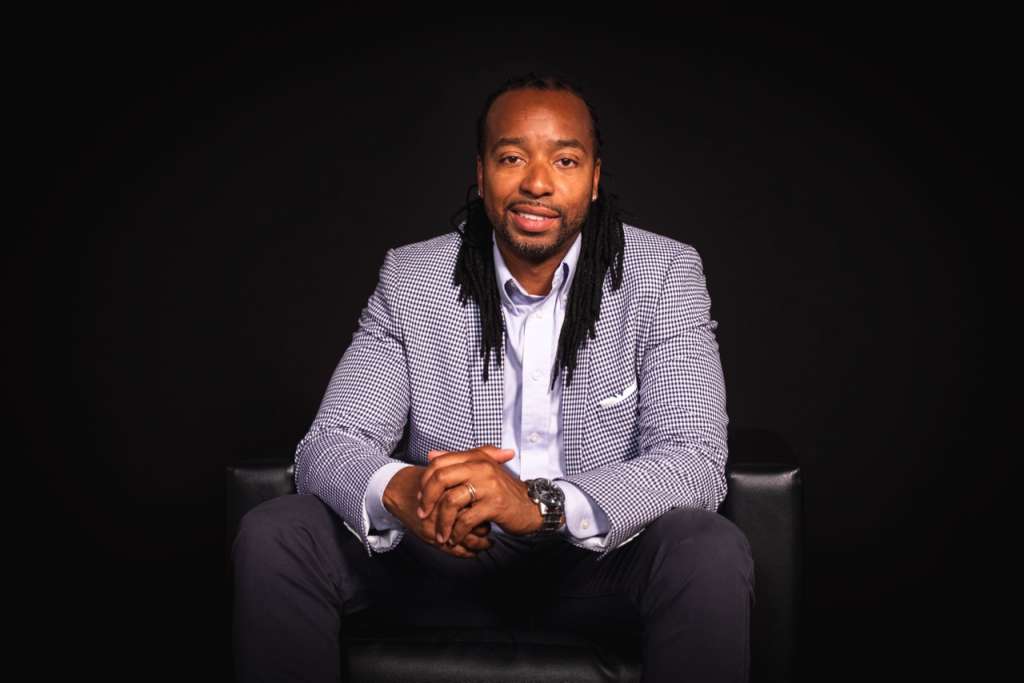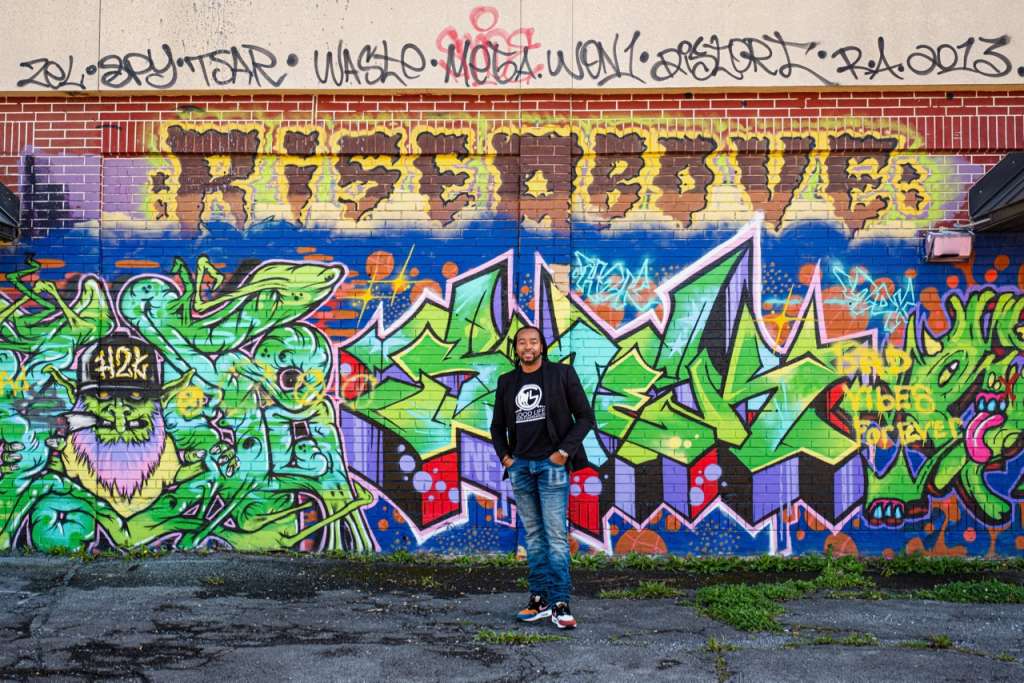
Source: Press Handout / Good Life Foundation
Hasan Stephens has a vision for the Black and Latino youth of Syracuse, NY—a city without a single Black radio station—and that is to teach them self-sustainability, using Hip-Hop as a tool. Many have made countless ducats off of the culture, without producing anything worthwhile but Stephens, a South Bronx native (and Hip-Hop head by birthright, really), has effectively angled the culture to inspire innovation in the youth of upstate NY.

Source: Press Handout / Good Life Foundation
Boppy jingles and transparent pandering aside, there’s a short list of people who have created something via Hip-Hop with staying power. Stephens insists that his organization, the Good Life Foundation, is the optimal model to watch. He’s right and the right people are watching.
Currently, the foundation is working on repurposing a warehouse in Syracuse. “Once we get this building up and running (the Hip-Hop Center for Youth Entrepreneurship), we’re looking into expanding into a lot of regional areas locally but we’ve been getting a lot of attention.”
Yes, attention.
From DC to Australia, the Good Life Foundation is making people rethink Hip-Hop. There’s never been a Hip-Hop based non-profit that serves the children and young adults of a community by use of Jay Z and Nipsey Hussle lyrics. There’s never been a foundation rooted in our culture that holds licensing for one of the biggest universities in the country. Stephens and his team have an innate and purpose-filled way of connecting with the youth of Upstate New York. One S. Carter would call it “genius talent.”
Hip-Hop Wired: How do you use Hip-Hop to teach these kids usable life skills?
Hasan Stephens: Part of our approach is literally the use of Hip-Hop culture in terms of doing a couple of things. Number one: it’s the retention. So we use the factor of ‘cool’ to really pull kids. We have kids calling us. We have kids staying with us, because they see us as relatable. We embrace the culture. Hip-Hop is an old culture now, to the point where there are multiple generations of the culture. We also use the culture to convey concepts of entrepreneurship and what we call cultural economics. We know that the culture itself is incredibly entrepreneurial and if kids are gonna think about the hustle in the corporate game, we can relate it through songs like Jay Z and Pharrell’s “Entrepreneur.” Or we may talk about lyrics from Nipsey Hussle that talk about ownership. It gets kids a little more open about learning these concepts but we also talk about the ways in which Hip-Hop is very materialistic and how our culture informs us negatively or positively in the ways we deal with money. So across the board, using Hip-Hop as a vehicle for understanding.
What was your motivation to start mentoring before Good Life was established?
I think it was always in me to give back because someone had done that for me. But as a DJ, because I was a Hip-Hop DJ at the radio station, there were some kids that sort of flocked to me and I talked to them about entrepreneurship. I also worked with them on doing parties and events. This one kid, Ron Funderberg, he branched off and did a clothing line called Unico Re, and the label is still around.
Is it frustrating to explain the importance of utilizing Hip-Hop in this way to people, possible sponsors, who don’t identify with the culture?
I think it is because when we talk to people that aren’t of the culture, the first thing they typically say is, “Oh. Well, how would you use Hip-Hop?” And early on , even some of our board of directors were very wary about using the terminology of “Hip-Hop” as a vehicle of understanding and I fought back constantly like, ”No. Hip-Hop is a positive culture.” Most people don’t know the history of Hip-Hop and how it was a social response to gang life, culture and violence in the South Bronx and so they only see the music that’s on popular entertainment and media and the negative concepts that we see perpetuated in it but when you teach people about the history, what it was and why it was created, then you talk about the entrepreneurial components and elements of it and the beauty that comes out of it and how it’s celebrated globally, people start to understand. So we usually give a brief description of Hip-Hop as a culture and not just the music for them to understand why these kids are attracted to it.
It seems that kids from certain environments will feel the connection, whether they’re in the city or the suburbs, but they typically don’t associate it with learning life skills.
To that point, they also don’t realize that it’s a culture sometimes. I’m from the South Bronx and we grew up learning a lot more about the culture because there were outlets and mediums that talked about it. But when you grow up in a place like Syracuse where historically there were some Black radio stations but currently we don’t have any. So these kids here are growing up, listening to the music and thinking that Hip-Hop is only rap. They don’t understand the history or the old school artists, the way that it evolved, and so there’s a lack of appreciation for their own identity. When we talk about the kids in Syracuse, we talk about the fact that they lack self-identity and purpose. Hip-Hop provides that because it’s really the soundtrack to the history of African Americans and Latinos in America. The purpose comes from entrepreneurship. I think Jay Z related it to “genius talent.” There’s a video where he says that everyone has a genius level talent and we take that genius level talent and find ways to make money from it.
To put it in perspective: there aren’t any Black stations at all in Syracuse?
Currently, we have one station that plays Hip-Hop and claims that they “play the most Hip-Hop” but then they don’t do anything to talk about the status or the inequities that African Americans and people of color experience up here. It’s literally just the music and even when you listen to the music, it’s not even just our music! They’re playing rock music and pop music and talking about ”We’re the home of Hip-Hop.” Nah, that’s not. You’re not.
And all these kids know about the culture is what they hear on the radio…
Exactly.
So, clearly there’s no social activism from the folks at the radio station. You guys have the corner on that side of things in Syracuse.
We’re the only organization that uses Hip-Hop to reach the youth and that’s not to say that they’re aren’t other social activist groups that work with kids but we have it as a part of our mission, it’s ingrained in the philosophy of our organization and the programming.
One of the biggest draws to your organization is what you offer in the way of teaching entrepreneurship. Can you speak a little about what the kids have been doing with GLF?
The biggest program that we have is called GLN Printing and it’s a full-service promotional print and embroidery company. We do services as well as allowing kids to design their own t-shirts and sell them, so two streams of revenue. In year one we generated about $70,000 gross in revenue, and that money goes directly back into the youth and programming for the youth. We’re also the only non-profit that holds the official licensing for Syracuse University — athletics and schooling in general. There’s never been another non-profit that actually has that licensing to produce and create the apparel for Syracuse University. We also just inked a partnership with the Allyn Family Foundation. This was the foundation connected to Welch Allyn — the medical supply company. They’re erecting a new development here in Syracuse called the Salt City Market. It’s going to house a number of different shops and we have a store that’s going in there called The Life and it’s going to be all t-shirts and swag and a lot of things that the kids themselves design. So each of the kids that have their own clothing label will be promoting those labels in the shop. We’re really excited about it because nothing like that has ever happened here, locally.
And you have vending machines.
We have four vending machines that are waiting to go out but because of COVID-19 and the loss of traffic in many places, it didn’t make sense for us to put it out right now. So that’s on hold but it’s set to expand this year. The other venture that we have is a lawn care company. It started with an idea of teaching kids how to walk into any situation or room and be able to make money when you don’t have the resources to go along with building businesses. We know that African Americans and Latinos oftentimes lack capital to start businesses, so what we did was, we said: “Well, what can we do? We can do lawn care. We can borrow someone’s lawn mower and use that to go door-to-door, then we can take that money and buy our own lawn mowers then build and expand from there.” Since then we partnered with a local agency called the Syracuse Model Neighborhood Corporation, they have over 88 properties and we hold a contract with them for our kids to do their landscaping and their lawns. They’re also learning other skill sets like painting and property maintenance and management.
The foundation’s working with young adults as well as kids, right?
We focus on 13 to 24-year-olds. This summer, we did a Hip-Hop Entrepreneurship Boot Camp Academy and we lowered the age limit to 12, because we started working with the Syracuse School District. These kids were doing five different ventures for the summer. They had the car wash, the lawn care company, the t-shirt company, some kids are doing STEM and robotics with Le Moyne College and we have another group doing a food stand. With the food stand they’re setting up shop everyday and learning about inventory, flow of service and so on.
How many kids and young adults does the foundation work with typically?
For the boot camp we have 60 youths, but over the past year we interacted with about 750 youths. So we have various programs: there’s the entrepreneurship program as mentioned but we also have the One Mic which is with the Syracuse City School district, where we deal with about 80 youths directly. So that means we mentor intensively these youths that are experiencing hurdles in what we call BAG data (Behaviour, Attendance, Grades), We’re also doing motivational Hip-Hop assemblies for another 500, 600 youths in the district so we’re interacting with the students in each school. We have another program called 315 LIFT (Life Influencers Focus on Teens), and this is through the county so we’re working with kids that are highly system-involved, in and out of the system — we’re talking about shooters, robberies and so on. We’re working with these kids to reduce recidivism and there are about 40 kids in that program.
The actual work you guys put in is amazing. Have you been fielding a ton of calls?
I was flown out to Loyola Marymount University to talk about our new building (the Hip-Hop Center for Youth Entrepreneurship). We also had Clinton Lacey, the head of Juvenile Justice in Washington DC, come out to Syracuse and take a tour of the building. We’ve also been doing Zoom meetings with the University of Sydney in Australia because they’re trying to figure out, based on what they’ve been seeing us doing online, one of their representatives there is trying to figure out how they can use our model to apply to the aboriginal population in Australia.
I think what we’re doing is innovative and out-of-the-box in terms of the application but of course Hip Hop has been around forever and it’s global so it’s like, why haven’t we thought about using Hip-Hop before? In education, they’re talking about the Hip-Hop pedagogue, but no one’s talking about engaging the youth on a Hip-Hop level and engaging that to keep them out of prison. I would like to see us combine with the Hip-Hop community and the artists. Right now, we’re reaching out to various artists to see how they can contribute to this new culture of ‘cool’ that kids can aspire to, to keep them from going in and out of the system.
Between 2013 and 2017, the Good Life Foundation reduced youth recidivism in Syracuse by 30% — an incredible feat. If you could use the money it takes to jail any one of these kids and repurpose it, what would you do?
I think if I could take the same amount of money that it takes to house them which is close to $300,000… If it was up to me, I would take part of that money and I would pay them to learn skill sets that would keep them from ever being incarcerated again. If we could start a business with them and teach them how to be sustainable, I think that would be the best thing we can do for these kids, because a lot of these kids don’t have any other options. They’re selling drugs because they need the money. They’re stealing out of cars and things like that because they lack resources and they need the money. So I’m talking about working with a kid and paying them to not only shape their own personal identity and get a trajectory for where they’re headed but to also figure out how they’ll be self-sustainable after that.
Good Life Foundation Founder Hasan Stephens Teaches Life Skills Through Hip-Hop was originally published on hiphopwired.com
<p>Facebook Live Is Loading....</p>





